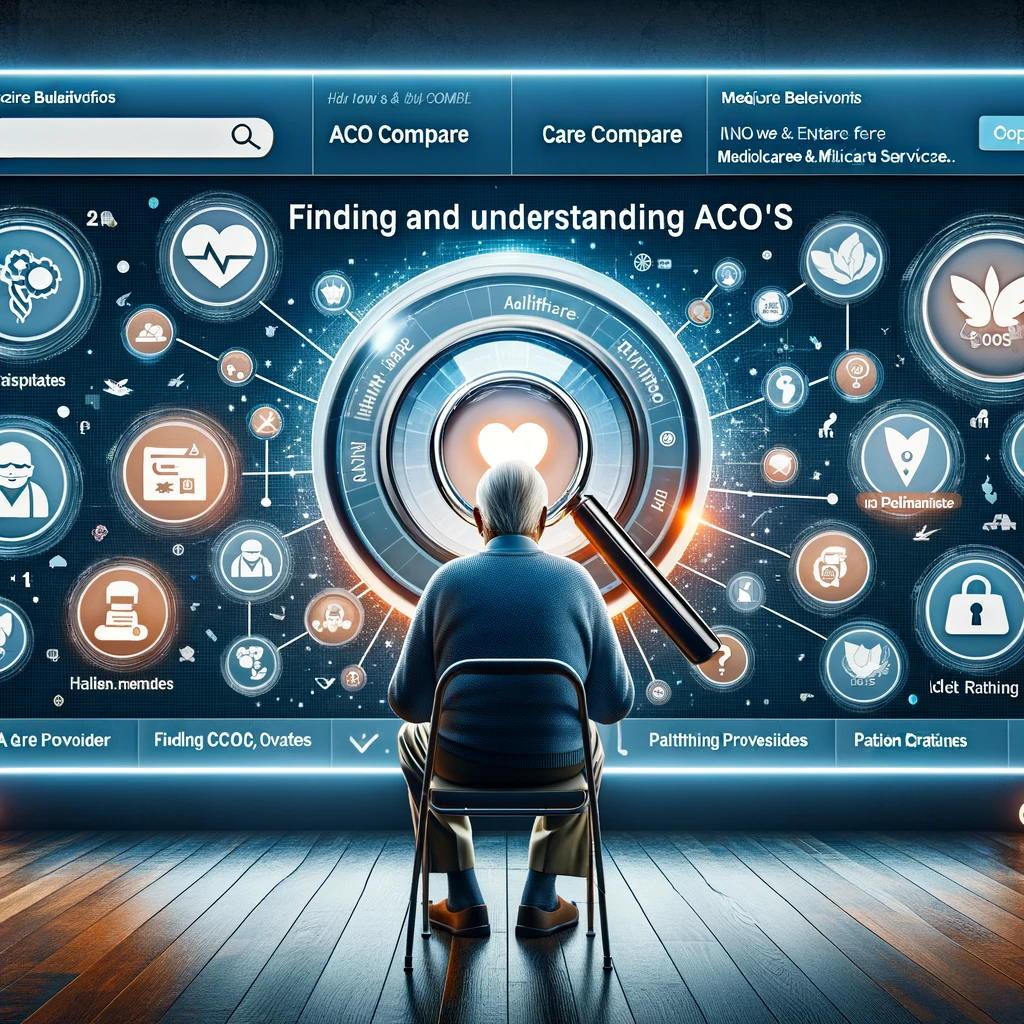Medicare's Transition to an Accountable Care Organization (ACO) Platform:What That Means to You
Explore Medicare's shift to an Accountable Care Organization (ACO) platform and its impact on your healthcare. Understand how ACOs aim to enhance care coordination, improve patient outcomes, and reduce costs through a network of providers focused on efficient, high-quality care

Understanding the Pros and Cons
I wanted to make you aware that Medicare is transitioning traditional Medicare consumers to an Accountable Care Organization (ACO) platform. This represents a significant shift in the healthcare system. This move, fueled by the Affordable Care Act, aims to transform health care delivery by encouraging hospitals, doctors, and other health care providers to join forces and improve health outcomes for Medicare beneficiaries.
The American public will not be given a choice. All Medicare recipients will no longer be given the choice of traditional Medicare. CMS now expects all traditional Medicare beneficiaries to be treated by a provider in value-based care model by 2030. As with any major change, understanding the pros and cons of accountable care organizations is crucial.
What are Accountable Care Organizations?
Accountable Care Organizations (ACOs) are a pivotal component of health reform, yet they are perceived in various ways — from being a necessary element to being likened to a “wolf in sheep’s clothing,” indicative of managed care under a different guise. Concerns have been raised about ACOs, particularly in public comments on the CMS draft rule, regarding the potential for withholding care inappropriately and threats to professional autonomy.
ACOs, similar to other healthcare financing and organizational structures, carry the risk of unintended consequences, including misaligned incentives and ethical challenges at both the clinician and organizational levels. The ability of ACOs to navigate these issues effectively remains uncertain. This is partly due to the absence of a framework to identify and address ethical challenges within ACOs.
Identifying these challenges in the early stages of ACO development is crucial. It can assist policymakers and ACO participants in avoiding unintended harms, fostering the success of ACOs, and preventing potential backlash, such as patient distrust, reminiscent of the challenges faced during the era of 1990s managed care. The evaluation of whether ACOs, on balance, represent an improvement in the healthcare system is a complex and ongoing process, one that requires careful consideration and responsive measures to ensure ethical and effective healthcare delivery.

Accountable Care Organizations: The Backbone of the Transition
ACOs are groups of doctors, hospitals, and other health care providers who come together voluntarily to provide coordinated high-quality care to Medicare patients. The core idea is to ensure that patients, particularly those with chronic diseases, get the right care at the right time while avoiding unnecessary duplication of services and preventing medical errors. This coordination is expected to result in better health outcomes for patients.
The Medicare Shared Savings Program and ACOs
A key component of ACOs is the Medicare Shared Savings Program. This program rewards ACOs for delivering care that meets specific quality benchmarks, including the effective use of electronic health records, while reducing costs. The program underscores the shift from a traditional fee-for-service model to one that rewards healthcare providers for keeping Medicare beneficiaries healthy.
Understanding the Benefits of ACOs
Improved Patient Care: With a focus on care coordination, ACOs can offer more personalized treatment plans, improving the quality of patient care.
Better Health Outcomes: By emphasizing preventative care and chronic disease management, ACOs aim to achieve better health outcomes for their members.
Cost Savings: ACOs provide a platform for shared savings, reducing unnecessary tests and treatments, leading to cost savings for the Medicare program and potentially for Medicare beneficiaries as well.
Resources for Small Practices: Joining an ACO can offer resources and less paperwork for small practices, allowing them to focus more on patient care.
The Challenges and Downsides
Referral Restrictions: ACOs might impose referral restrictions, limiting patients' ability to see specialists outside of the ACO network.
Financial Risk: ACOs take on financial risk; if they do not achieve cost savings and improved outcomes, they may face financial penalties.
Complexity for Providers: For healthcare providers, transitioning to an ACO model requires significant changes in how they deliver care and report outcomes.
Downside Risk for Smaller Providers: Smaller practices may face more significant challenges in absorbing the downside risk if cost savings are not realized.

What Medicare Beneficiaries Can Expect
Costs and Supplemental Plans: While the ACO model aims to reduce costs, Medicare beneficiaries may still find the need for supplemental plans to cover aspects not handled by Original Medicare.
Access to Providers: Patients might see changes in access to certain healthcare providers as ACOs emphasize care within their network.
Quality of Care: Beneficiaries can expect a focus on improving quality and coordinated care, especially for those with chronic conditions.
Cost Sharing Expectations: Cost-sharing structures are expected to continue, but overall costs may decrease as ACOs succeed in reducing unnecessary services.
Medicare's transition to an ACO platform, as part of the Affordable Care Act, marks a substantial shift in the Medicare program. While there are potential benefits like improved patient care, better health outcomes, and cost savings, there are also concerns regarding access, financial risk, and the complexities for providers in adapting to this model. As the healthcare system continues to evolve, understanding these changes is crucial for Medicare beneficiaries, healthcare providers, and all stakeholders in the health care system.
Medicare's Transition to an Accountable Care Organization (ACO) Platform
As healthcare evolves, Medicare is undergoing a significant transformation by moving towards an Accountable Care Organization (ACO) model. This transition marks a pivotal shift in how healthcare is delivered and financed for millions of Americans. This article explores the timeline of this transition, its advantages and disadvantages, and what it means for individuals with traditional Medicare, particularly concerning costs, supplemental plans, and cost-sharing expectations.
Timeline for the Transition to ACOs
The shift to ACOs isn't an abrupt change but a gradual process. The Centers for Medicare & Medicaid Services (CMS) began experimenting with ACOs as part of the Affordable Care Act in 2010. Since then, various ACO models have been tested and implemented. The goal is to have a significant portion of traditional Medicare payments channeled through ACOs by 2030. However, it's important to note that specific dates can vary, subject to policy changes and healthcare reforms.
Impact on Traditional Medicare Beneficiaries
Costs
For beneficiaries, one of the main questions is how this shift impacts their healthcare costs. The ACO model is designed to maintain or reduce costs for patients while improving care quality. Beneficiaries might see lower costs due to reduced hospital readmissions and a greater emphasis on preventative care.

Medicare Supplements
As Medicare transitions to ACOs, the role of Medicare Supplement Insurance (Medigap) policies remains crucial. These policies cover gaps in Original Medicare, such as copayments, coinsurance, and deductibles. The need for Medigap policies will likely continue, as ACOs primarily affect how care is delivered and paid for, rather than changing the fundamental coverage of Medicare.
Cost-Sharing Expectations
Under the ACO model, cost-sharing structures (like copayments and deductibles) are expected to remain, as they are integral parts of Medicare's design. However, the overall out-of-pocket expenses could be impacted positively as ACOs succeed in reducing unnecessary services and improving care efficiency.
The transition of Medicare to an ACO model is a significant step toward modernizing healthcare delivery and financing. It aims to improve care coordination, enhance patient outcomes, and control healthcare costs. While there are challenges in implementing such a comprehensive change, the potential benefits for patient care and cost efficiency are substantial.
Beneficiaries under traditional Medicare can expect to see changes in how their care is coordinated, with a potential for cost savings and improved care quality. However, the need for supplemental insurance is likely to persist due to the structure of Medicare. As the healthcare landscape continues to evolve, staying informed about these changes is crucial for all Medicare beneficiaries.
Accountable Care Organizations (ACOs) and Cost Sharing in Medicare
Accountable Care Organizations (ACOs) are a transformative element of the Medicare program, reshaping how healthcare is delivered and financed. These care organizations, incentivized under the Medicare Shared Savings Program, play a pivotal role in the healthcare system, particularly for Medicare beneficiaries.
Financial Incentives and Responsibilities in ACOs
ACOs are financially rewarded for reducing healthcare costs while maintaining high-quality care for Medicare patients. This system operates under a shared savings model, where Medicare and ACO providers split the savings achieved. However, it's not just about cost savings; ACOs are also accountable for improving health outcomes. They face financial penalties if the healthcare costs of their patients exceed predetermined targets, emphasizing the importance of efficient and effective patient care.

Finding and Understanding ACOs
Many Medicare beneficiaries might be receiving care from ACO-affiliated healthcare providers without realizing it. To determine if your healthcare provider is part of an ACO, simply inquire directly with them. Additionally, the Centers for Medicare & Medicaid Services (CMS) offers resources like the Care Compare website and an ACO web page, helping beneficiaries find and compare healthcare providers and facilities within ACOs. These platforms provide crucial information, including quality performance results and details on whether a provider is part of an ACO.
Quality Measures and Performance
ACOs are evaluated on various quality measures, encompassing patient screenings for diseases like breast and colorectal cancer, flu vaccination rates, and screenings for fall risks and depression among Medicare enrollees. Patient satisfaction metrics also play a key role, assessing the communication skills of providers, timely access to appointments and specialists, and the helpfulness of office staff. These metrics ensure that ACOs not only deliver cost-effective care but also prioritize patient needs and satisfaction.
Cost Sharing and Its Impact on Healthcare Consumers
Cost sharing is a fundamental aspect of ACOs and the Medicare program. It refers to the portion of healthcare costs that patients are responsible for paying, which includes deductibles, copayments, and coinsurance. In the ACO model, cost sharing plays a significant role in managing healthcare expenditures.
While ACOs aim to reduce overall costs through efficient care coordination and eliminating unnecessary tests and services, Medicare beneficiaries may still encounter some cost-sharing responsibilities. However, the efficiency of ACOs in managing healthcare services could lead to more predictable and potentially lower out-of-pocket expenses for patients.
The integration of ACOs into the Medicare system under the Affordable Care Act represents a significant shift toward coordinated, high-quality care. While there are complexities involved, such as understanding cost sharing and keeping track of provider affiliations, the potential benefits for Medicare beneficiaries are substantial. These include better health outcomes, enhanced care coordination, and potentially, cost savings. As ACOs continue to evolve and grow within the healthcare landscape, they offer a promising path to a more effective and patient-centered health care system.
Joining an Accountable Care Organization (ACO) can have several impacts on beneficiaries of traditional Medicare.

Here's a detailed look at what they can expect:
Enhanced Care Coordination
ACO Model: ACOs focus on coordinated care, aiming to ensure that various healthcare providers work together seamlessly.
Impact: Medicare beneficiaries may experience more streamlined and cohesive care, especially beneficial for those with chronic conditions.
Potential for Improved Health Outcomes
Preventive Care: ACOs emphasize preventive care and regular monitoring.
Effect: This can lead to early detection and treatment of health issues, potentially resulting in better health outcomes.
Changes in Provider Network and Access
Network Restrictions: ACOs often have a defined network of providers.
Consequence: Beneficiaries might face some limitations in provider choice but can benefit from a team of providers who communicate and collaborate more effectively.
Financial Aspects
Costs and Savings: ACOs are incentivized to provide high-quality care while reducing unnecessary costs.
Result: Beneficiaries could see lower out-of-pocket costs due to fewer unnecessary tests and procedures.
Impact on Medicare Supplements
Supplemental Plans: Beneficiaries with supplemental plans (like Medigap) may continue to find these plans beneficial.
Need for Supplements: The need for supplemental insurance might persist, as ACOs mainly affect service delivery and coordination.
Shared Decision-Making
Patient Involvement: ACOs encourage active patient involvement in healthcare decisions.
Outcome: Beneficiaries might experience more personalized care aligned with their preferences and values.
Quality of Care
Quality Metrics: ACOs are measured on various quality metrics and are rewarded for meeting specific health outcomes.
Expectation: Beneficiaries can expect a focus on quality care, potentially leading to higher satisfaction.
Transparency and Reporting
Data and Reporting: ACOs require robust data reporting and transparency.
Benefit: This can lead to more informed decision-making and improvements in care over time.
For traditional Medicare beneficiaries, joining an ACO can bring about a more coordinated healthcare experience, potential cost savings, and improved health outcomes. However, it also may involve adjusting to network limitations and a new approach to healthcare delivery. The overall impact will depend on the individual's health needs, the effectiveness of the ACO, and the continued need for supplemental coverage.
